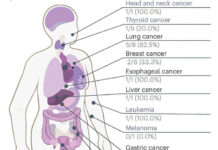Emerging Evidence of a Connection
Human papillomavirus (HPV) not only causes various cancers but also appears to significantly increase the risk of heart disease and coronary artery disease, according to a new study presented at the American College of Cardiology’s Annual Scientific Session (ACC.25). While researchers have only recently begun exploring this connection, this study is the first to analyze data from multiple global studies, totaling nearly 250,000 patients. The findings strengthen the evidence of a significant relationship between HPV and cardiovascular disease, prompting further investigation by scientists, healthcare providers, and patients alike.
The Role of Chronic Inflammation
Dr. Stephen Akinfenwa, an internal medicine resident at the UConn School of Medicine and the study’s lead author, emphasized the importance of these findings. He noted that while the exact biological mechanism remains unknown, researchers suspect chronic inflammation plays a crucial role. The ultimate goal is to determine whether reducing HPV through vaccination could also lower cardiovascular risk.
Understanding HPV and Its Impact
HPV spreads through intimate contact and can cause genital warts as well as cancers of the genitals, anus, and throat. The U.S. Centers for Disease Control and Prevention (CDC) recommends HPV vaccination for all children and teenagers to prevent related cancers. However, many U.S. adults remain unvaccinated because they were past the recommended age when the vaccine became available in 2006.
Study Methodology and Data Analysis
As reported by news-medical.net, researchers conducted a meta-analysis of seven studies from 2011 to 2024 that examined HPV status and cardiovascular outcomes. The studies, which followed patients for three to 17 years, came from the United States (three), South Korea (two), Brazil (one), and Australia (one). Most were retrospective and longitudinal cohort studies.
Using various statistical approaches, the researchers assessed the link between HPV and cardiovascular disease, coronary artery disease, and high blood pressure. They accounted for confounding factors such as smoking, diabetes, lifestyle behaviors, and family history of heart disease.
Key Findings
The study revealed that HPV-positive individuals had a 40% higher likelihood of developing cardiovascular disease and double the risk of coronary artery disease compared to HPV-negative individuals. Even after adjusting for sociodemographic and medical variables, HPV-positive patients still had a 33% higher risk of cardiovascular disease. However, the study did not find a statistically significant association between HPV and high blood pressure.
Clinical Implications and Future Research
Given these findings, Akinfenwa suggested that clinicians should consider closer cardiovascular monitoring for HPV-positive patients, similar to how they manage individuals with traditional heart disease risk factors. He highlighted that conventional risk factors like smoking and high blood pressure explain only about 80% of cardiovascular disease cases, leaving a substantial portion unaccounted for. Identifying non-traditional risk factors, such as HPV, could help close this gap and guide future prevention strategies.
Further research is necessary to fully understand the mechanisms linking HPV to heart disease and to explore whether HPV vaccination could play a role in reducing cardiovascular risks. This study underscores the need for continued investigation into the broader health impacts of HPV and the potential benefits of widespread vaccination efforts.
























